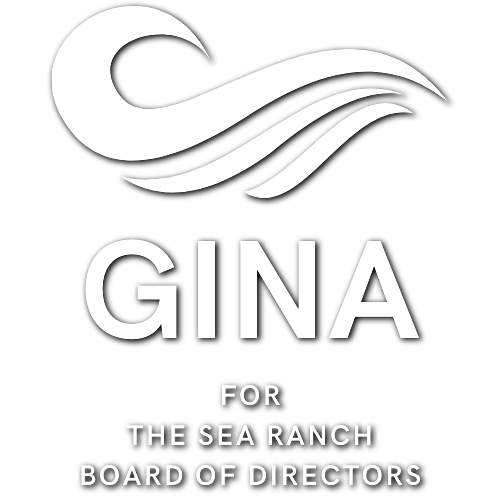
First Statement
Many of you know me, but many of you may not. I am a Sea Ranch kid.
For my twelfth birthday, I wanted a trip to the ocean. My parents rented a home at TSR. During the next ten years, we rented that house so many times that we saw ourselves as members of a community living “lightly on the land.” We explored forests, played on beaches, shelled at low tide. I swam in a secret cove, calm (and cold), fished with my father off the cliffs for lingcod, searched for chanterelles near the tan oaks.
My watching the wildlife, the deer and bobcats, whales and seals, and sea birds, especially cormorants, nesting near our rental, gave me an enduring appreciation for nature and its inhabitants. I always have understood that I am the guest and that TSR and its wildlife are my host, and that my respect for them is critical to their well-being and my own.
My life as a TSR homeowner had to wait. I received a B.A from Stanford University and a J.D. from Northwestern University. I practiced corporate law at the international firm Sidley & Austin for five years. Next, I accepted an offer from Credit Suisse, an investment bank, to work on complex financial transactions. Nineteen years later, I joined Guggenheim Partners, an international private investment and securities firm. A Senior Managing Director, for years, I retired in 2020.
By 1988 I had saved enough to purchase a William Turnbull house built in 1974. I worked with Bill on a renovation of the old house. I myself performed, at my skill level, manual labor tasks such as mixing cement and digging trenches. My goal was to create a home where I could someday live full time. As my professional career continued, I would always tell people, “I work in New York and live at The Sea Ranch.” In 2020, I was able to shift my life completely (with Mr. Bingley, my rescue dog) to TSR.
Now, here, full time, I clearly can see TSR can be a different experience for those who see TSR as a primary home, versus those who have not yet made the move, versus those who consider their property an investment, versus those who see TSR as a business opportunity.
Varying perspectives make for different interpretations of what it means to “live lightly on the land.” As TSR’s population grows, these differences can lead to debate and discord. We feel a constant tension as we address the community’s needs and individual owners’ desires.
The Sea Ranch’s fundamental design – large common areas and close knit homes – demands we embrace a communal perspective. Our founders’ conception provides a consistent vision to arrive at a supportable and supported future. TSR needs to face and respond to change as a collective body or TSR will become merely a luxury resort.
My work on the TSR Planning Committee – I’m currently the Chair – and on the TSR Finance Committee has taught me our current challenges --
How can we support Community Manager Menka Sethi who actively has fostered a renewed sense of community and who diligently has corrected the former CFO’s chaotic financing policies and accounting procedures?
How do we protect the Community Manager from the frequent attacks from inside and outside the Board that conceptualize TSR as an island rather than as a community that depends on our region’s services and goodwill?
How do we react to climate change and minimize our contribution; how do we keep the airport legal and safe; how do we preserve the forests as we resist fire; how do we find housing for our coastal workers; how do we prevent escalating house prices and some members’ escalating demands from injuring our egalitarian culture?
TSR needs to use its original values, not create new ones, to address ecological, demographic, and financial issues. Each of us may define TSR values slightly differently, but my hope is the vast majority of us have a reverence for our Commons, a desire to preserve the lands which still are wild, a preference for public and private architecture that avoids ostentation, a deep appreciation for our volunteers as well for our staff.
Living lightly is not only a physical construct but also an economic one. Maintaining fiscal integrity is not a luxury but a necessity where soaring monthly fees might drive out members and reduce economic diversity. Menka understands this issue: this year TSRA produced a flat budget.
For 35 years, at my three firms, I’ve developed solutions for complex financial issues, modeling the rewards and risks of different strategies. My decades of work with corporations and individuals, with their attorneys and my firm’s attorneys, have required reasoned but rapid responses, consistent and open dialogue, diplomacy, teamwork, and accountability. In any financial arrangement, I have learned competing interests and often conflicting influences must be considered and integrated.
My hope is my experience in finance and in TSR committees will allow me to help develop financial strategies and plans for TSR to achieve short term and long term financial and social stability.
My second statement will address three critical issues for members.
First, we need to support and retain our current Community Manager. She has served us well during not only our winter storms but also our financial storms. She has uncovered and started to address the legal and financial irregularities that threaten this community.
Second, we need to honor the Restrictions and preserve our Commons for the benefit of all members and not just for a select few.
Third, we need to achieve financial stability by insisting upon financial planning that rigorously analyzes our capital structure, our infrastructure, our revenues, and expenditures.
For decades, I have wanted to preserve TSR not only for adults but also for the next twelve year old who comes here for a birthday.
I hope to meet you at Del Mar House April 13 at 4:30 or May 5 at 4:30.


